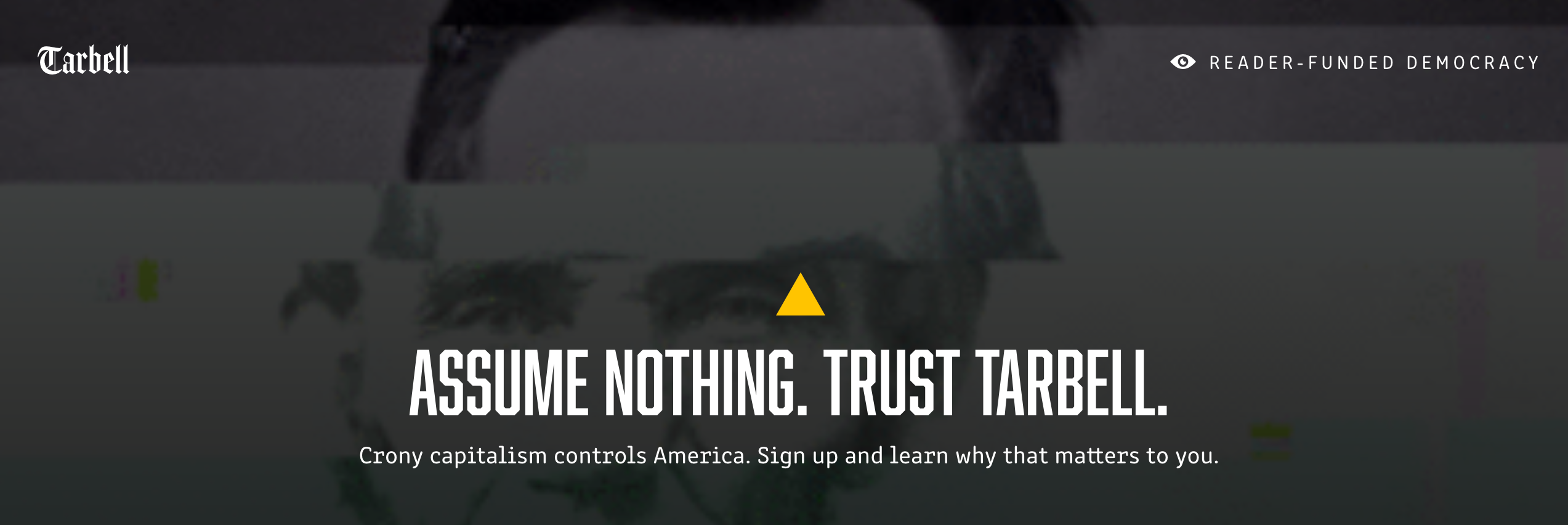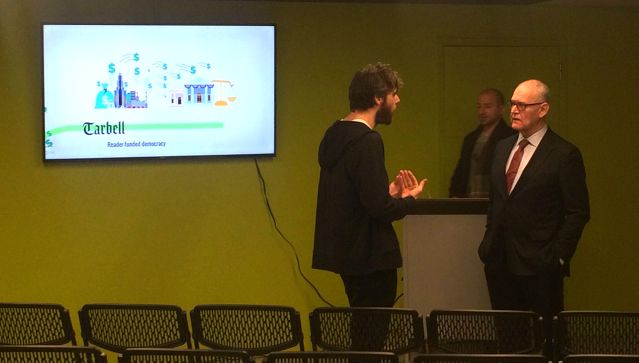
Wendell Potter spent 19 years of his life in the health insurance industry. For 15 of those, he was the mouthpiece for one of the largest companies in the industry, eventually working his way up to be the Vice President for Communication. Each day he went to work with a tough demeanor until one day he had to explain to the press why his company would not be insuring a sick young girl’s liver transplant.
That little girl died and he realized he had to get out of that career, even though he had no future plans in sight. He resigned.
In that moment, Potter’s ethics took over from his ambition. He would give an insider’s view of corporate America and try to make change.
Potter originally began his career working in the healthcare field before starting his own nonprofit in journalism. For four years he worked for a company called Humana in Louisville, Ky., until he was recruited by Cigna Healthcare where he worked for 15 years.
“One of my jobs was to handle what we call ‘high profile cases’ that came to the attention to the news media,” Potter said. “There was a 17-year-old girl in Los Angeles who had leukemia, and the initial treatments were successful but she started getting sicker and she needed to have a liver transplant.”
This girl, Nataline Sarkisyan, was covered by Cigna under her father’s health insurance policy. Though the policy covered transplants, Cigna denied her the liver transplant and soon after news outlets began publicizing and questioning their decision.
“My staff and I put together some sort of a silly statement that we felt we’d just give the reporter and the story would go away,” Potter said. “It didn’t.”
Eventually, after the story went from a local issue to a national story and public relations issue for Cigna, they decided to cover her transplant in order to make the story go away (something Potter had been recommending).
“I was really delighted that the company decided to do that,” Potter said. “But so much time had passed since the initial request for the liver transplant was made by her doctors that she got sicker and, within five hours of Cigna agreeing to cover it, she died.”
“I just was devastated,” Potter said. “I couldn’t in good conscience continue to do that. I didn’t have it in me anymore to work for the insurance industry, to be the guy on the phone to try to make things go away.”
Within a couple weeks of Nataline’s death in December 2007, Potter turned in his resignation. With no plans and no new job lined up, he spent about a year trying to figure out what he should be doing. He then realized he had an insider’s perspective of how the insurance industry works, something that could help many people, as well as lawmakers in Washington who typically only got this information from their lobbyists.
“It came with a result of actually going to Washington, offering first to just kind of work behind the scenes with advocates to help them understand more about the insurance industry and what they likely were going to be doing to try to influence the health care reform debate,” Potter said.
After spending some time working with those advocates, they encouraged him to consider testifying before the U.S. Senate about his experiences with big health insurers.
“I realized if I wanted to make a difference, this might be my one time,” Potter said. “So I agreed to testify and it was kind of a high-profile thing. It was covered by media, stories then appeared in the Washington Post and I got a call from CNN right away and they wanted to do a piece.”
Potter’s work to get this information out did not end with his testimony. In 2010, his first book, “Deadly Spin: An Insurance Company Insider Speaks Out on How Corporate PR is Killing Health Care and Deceiving Americans,” was published and later made him a New York Times bestselling author.
Now, Potter plans to continue this mission of informing and enlightening others through a new media organization.
Named after Ida Minerva Tarbell, a “muckraker” from the early 20th century whose journalism forced multiple large monopolies to break up, Tarbell, founded by Potter, hopes to do the same. Unlike other news organizations, they plan to reveal the inner workings of big businesses who are manipulating politics.
On Jan. 26 Tarbell held its inaugural salon, the Philadelphia Ida Logue. There, the leaders of the organization explained their goals for the launch to various potential supporters.
As the nation battles over fake news, the so-called “lying media” and “draining the swamp” of insiders in DC, Tarbell hopes to become a respected and trusted source for news, especially news about how corporations and government team up against ordinary citizens. It will focus on issues like health care, student debt and the environment.


“Other news outlets watch politicians,” their website reads. “Tarbell watches their bosses- the people who write the checks.”
Though their headquarters is located in Philadelphia, Potter’s plan includes working with journalists nationwide to use solutions journalism to tell the stories of people responding to the problems of the country and making a difference.
“We will be actually looking for good reporters all over the country who may, for example, have some particular expertise in covering health care, or covering banks and finance, or student debt or the environment,” Potter said. “We want to help to also showcase some of the work that they’re doing locally. They may be reporters in Memphis writing for local publications but we would be able to give them a national platform for their work.”
Not only do they plan to target those people who are current voters or active in politics, but Potter said they plan to reach college students and even younger students and teachers nationwide who could use this journalism within their classrooms.
He hopes that through bringing these issues to light and finding quality reporting, people will understand the importance of civic engagement and the fact that the major problems of the country can be solved.
“People need to be aware. They need to be informed,” Potter said. “One of the things that will separate us is that we’re going to be helping people see that there are solutions, what they are and that they can get engaged to really solve societal problems in a way that nobody else has done in journalism.”



